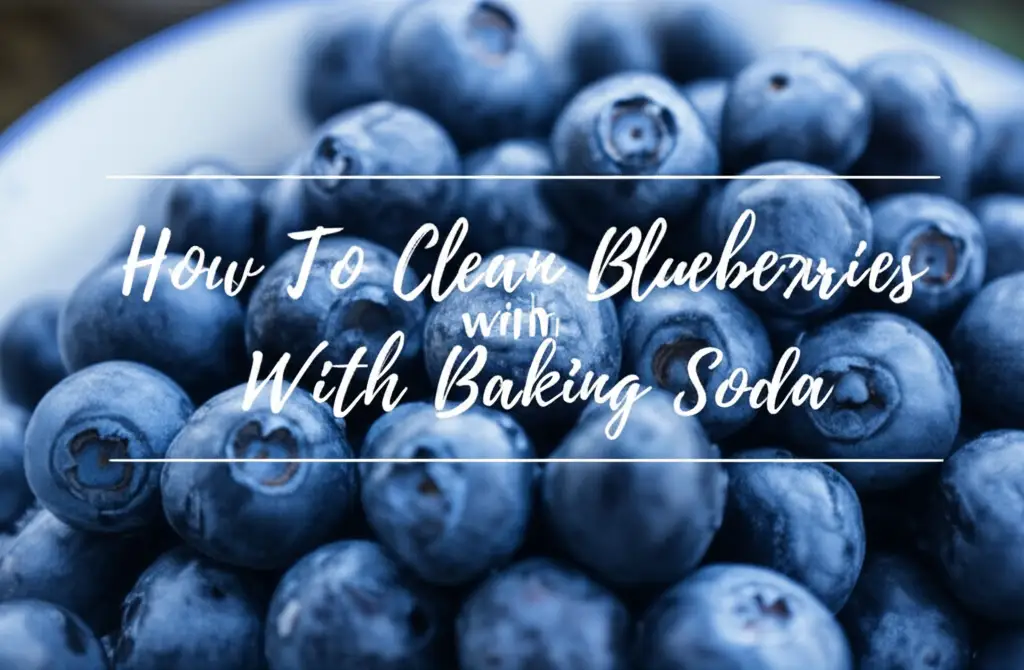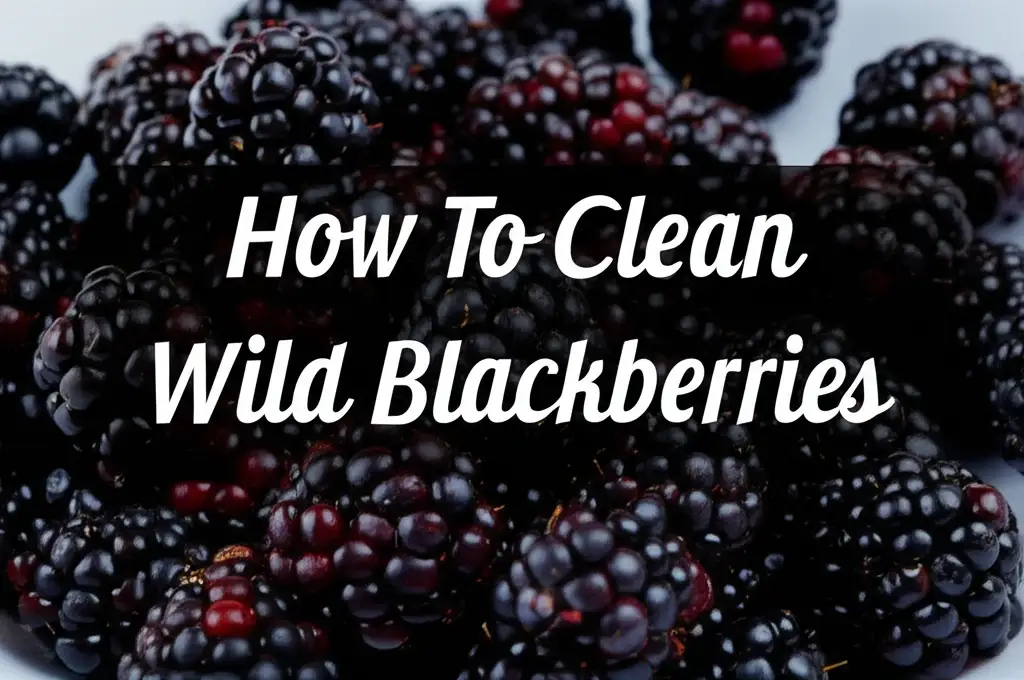· Food Cleaning · 13 min read
How To Clean Blueberries With Baking Soda

Unlock Freshness: How to Clean Blueberries with Baking Soda
There is nothing quite like a bowl of fresh blueberries. Their tiny size and delicate skin make us wonder if we truly get them clean. Many people are concerned about pesticides, dirt, and wax on their produce. Cleaning blueberries properly is important for your health and enjoyment.
I want my berries to be as clean as possible before eating them. Using baking soda offers a simple, effective, and natural solution. This method helps remove unwanted residues. This article will show you exactly how to clean blueberries with baking soda. We will cover why it works, the step-by-step process, and how to store your berries.
Takeaway:
- Baking soda effectively removes pesticides and dirt from blueberries.
- A simple baking soda soak cleans delicate berries gently.
- Proper drying and storage keeps blueberries fresh longer after washing.
Cleaning blueberries with baking soda is a simple process. Mix one teaspoon of baking soda per four cups of water. Soak the berries for 10-15 minutes. Gently rinse them under cool, running water. This method helps remove dirt and pesticide residues, making your blueberries safer to eat.
Why Cleaning Blueberries Is Essential for Your Health
Blueberries are a healthy snack. However, they can carry unwanted residues. These residues include dirt, debris, and sometimes pesticide traces. Their delicate skin and small size make them hard to clean thoroughly with just water.
Think about how many hands touch your fruit before it reaches you. Blueberries travel from farms to stores. They collect environmental contaminants along the way. Even organic blueberries can have dirt or natural residues. Ensuring your blueberries are clean reduces your exposure to these substances. It helps you enjoy them safely.
Pesticides are a significant concern for many people. Farmers use pesticides to protect crops from pests. While regulations exist, some residues might remain on the fruit. Washing with plain water does not always remove these completely. This is where a more effective cleaning agent becomes valuable. My goal is always to reduce any risks from my food.
A proper wash also improves the taste and texture of your blueberries. Removing the waxy film or dirt can make them more enjoyable. The true flavor of the berry can shine through. Cleaning your blueberries is a small step. It makes a big difference in food safety and eating pleasure.
The Science Behind Baking Soda for Produce Cleaning
Baking soda, or sodium bicarbonate, is a common household item. It works as an excellent natural cleaner. Its effectiveness comes from its slightly alkaline nature. When baking soda mixes with water, it creates a dilute alkaline solution. This solution helps break down certain compounds.
Studies have shown baking soda can remove more pesticide residues than plain water. The alkaline solution helps neutralize acidic pesticide compounds. It can also break down the waxy layers on fruit. These layers often trap dirt and pesticides. Baking soda helps lift them away from the fruit’s surface. This gentle action makes it perfect for delicate fruits like blueberries.
Many people choose baking soda over other cleaners because it is food-safe. It leaves no harmful chemical residues behind. Unlike some commercial produce washes, baking soda is non-toxic. It is also very affordable. You probably already have it in your pantry. I find comfort in using ingredients I trust in my kitchen.
Baking soda is versatile for cleaning around the home. It can clean various surfaces and items. For example, it is effective at cleaning kitchen appliances. I often use it to clean coffee maker with baking soda. Its mild abrasive qualities also help with tough stains. Many people even use it to clean stainless steel pans with baking soda. This shows its broad utility beyond just cleaning produce.
Step-by-Step Guide to Cleaning Blueberries with Baking Soda
Cleaning blueberries with baking soda is simple. It requires only a few items. Follow these steps for thoroughly cleaned berries. This process ensures you remove unwanted residues.
What You Will Need:
- A bowl or basin
- Fresh blueberries
- Baking soda (sodium bicarbonate)
- Cool, clean water
- A colander
- Paper towels or a clean kitchen towel
The Cleaning Process:
- Measure Your Blueberries: Place the desired amount of blueberries into your clean bowl. Avoid washing too many at once. Blueberries keep better unwashed. Wash only what you plan to eat soon. This helps them stay fresh.
- Prepare the Baking Soda Solution: For every 4 cups of blueberries, add 1 teaspoon of baking soda to your bowl. If you have fewer berries, adjust the baking soda amount accordingly. It’s usually about 1/4 teaspoon per cup.
- Add Water and Gently Swirl: Pour cool, clean water over the blueberries until they are fully submerged. Gently swirl the bowl or stir the berries with your hand. This helps the baking soda dissolve and mix evenly. You will see some fine particles floating. This is normal.
- Soak the Blueberries: Let the blueberries soak in the baking soda solution. A soaking time of 10 to 15 minutes is ideal. For very dirty berries, you might extend it to 20 minutes. Avoid soaking them for too long. Long soaking can make the berries absorb too much water. This can change their texture.
- Rinse Thoroughly: After soaking, pour the blueberries into a colander. Rinse them under cool, running water. Make sure to rinse every berry. This step removes any remaining baking soda residue. It also washes away loosened dirt and pesticides. Continue rinsing until no suds or residue remains. This is similar to how I would clean strawberries with baking soda.
This method is effective and gentle. It prepares your blueberries for enjoyment.
Proper Rinsing and Drying Techniques for Clean Blueberries
After soaking blueberries in baking soda, thorough rinsing is vital. Rinsing removes loosened dirt, pesticides, and baking soda residue. Improper rinsing can leave a powdery film on your berries. This film can affect their taste.
To rinse, place your blueberries in a colander. Hold the colander under cool, running water. Use a gentle stream. Agitate the berries gently with your hand. This ensures water reaches every surface. Continue rinsing for at least 30 seconds to a minute. You want to see the water running clear from the bottom of the colander. This indicates all residues are gone.
Drying is as important as washing. Wet blueberries spoil much faster. Excess moisture promotes mold growth. I always make sure my berries are completely dry before storage. This step keeps them fresh longer.
Drying Methods:
- Paper Towel Method: Spread a clean layer of paper towels on a flat surface. Gently spread the rinsed blueberries in a single layer on the towels. Pat them very gently with another paper towel. Allow them to air dry for 15-30 minutes. This method is effective for small batches.
- Clean Kitchen Towel Method: Use a clean, lint-free kitchen towel. Lay it flat and spread the blueberries in a single layer. Gently roll or pat them. You can also cover them with another towel and gently roll. This absorbs moisture.
- Salad Spinner (with caution): For larger batches, a salad spinner can work. Place the berries in the spinner’s basket. Spin gently and briefly. Too much force can bruise delicate blueberries. This method removes surface water quickly.
Always ensure blueberries are completely dry before storing them. This attention to detail will keep your berries firm and delicious.
Storing Blueberries After Cleaning to Maintain Freshness
Proper storage is critical after cleaning your blueberries. Wet or improperly stored berries can spoil quickly. The goal is to keep them dry and cool. This helps prevent mold and extends their shelf life. I always follow specific steps to ensure my hard work in cleaning pays off.
Once your blueberries are completely dry, avoid placing them back into their original container if it’s wet or flimsy. Many store-bought containers promote moisture. You need a container that allows for air circulation and minimizes condensation. This helps to prevent moisture buildup.
Ideal Storage Methods:
- Airtight Container with Paper Towel: Line an airtight container with a fresh paper towel. Place the dry blueberries in a single layer if possible. If you have too many, use multiple layers of paper towels between layers of berries. The paper towel absorbs any lingering moisture. Seal the container tightly.
- Ventilated Container: Some containers are designed with vents. These help air circulate and reduce condensation. You can also use a colander placed inside a larger bowl. Cover this setup loosely with plastic wrap or a lid. This allows air to flow around the berries.
- Do Not Wash Until Ready to Eat: For best results, wash blueberries only when you plan to use them. Unwashed blueberries last longer in the refrigerator. This is because their natural protective bloom remains intact. If you wash a large batch, dry them thoroughly. Then store them as described above.
Store cleaned and dried blueberries in the refrigerator. Place them in the crisper drawer. They should last for 5-7 days when stored properly. Always check for any moldy berries before consuming. Discard any that show signs of spoilage. This ensures the rest of your batch stays fresh.
Common Mistakes to Avoid When Cleaning Blueberries
Even simple tasks like cleaning blueberries can go wrong. Avoiding common mistakes ensures your berries stay fresh and delicious. These errors can lead to bruised fruit or premature spoilage. I have learned these lessons over time.
One major mistake is over-soaking. While a 10-15 minute soak is good, leaving blueberries in water for too long is not. They can absorb too much water. This makes them mushy and tasteless. It also speeds up spoilage. Stick to the recommended soaking times.
Another common error is not rinsing thoroughly. Leaving baking soda residue can affect the taste of your blueberries. It can also leave a chalky film. Always rinse until the water runs completely clear. Gently agitating the berries helps. My experience shows thorough rinsing is key.
Improper drying is perhaps the most frequent mistake. Placing wet blueberries directly into a container is a recipe for mold. Moisture is mold’s best friend. Take the time to dry your berries completely. Patting them dry or air-drying on towels is essential. Remember, wet berries spoil quickly.
Washing too many berries at once is also a mistake. Blueberries last longer unwashed. Their natural bloom protects them. Only wash the amount you plan to eat within a day or two. This preserves the freshness of the rest of your batch. Washing all berries at once means you must dry them perfectly and consume them quickly.
Finally, using hot water for washing should be avoided. Hot water can break down the delicate skin of blueberries. This makes them soft and speeds up decay. Always use cool or cold water for washing produce. Following these tips will help you enjoy perfectly cleaned, fresh blueberries every time.
Comparing Baking Soda to Other Blueberry Cleaning Methods
While baking soda is highly effective, other methods exist for cleaning blueberries. Understanding their differences helps you choose the best approach for your needs. Each method has its pros and cons.
Plain Water Wash:
Many people simply rinse blueberries under plain tap water. This method removes loose dirt and some surface grime. However, it is less effective at removing pesticide residues or the waxy film. Studies show water alone does not significantly reduce pesticide levels on fruit. While quick, it may not provide the deepest clean. I use plain water only for very quick rinses if I am in a hurry.
Vinegar Soak:
Vinegar, especially white vinegar, is another popular natural cleaner. A solution of 1 part vinegar to 3-4 parts water is common. Vinegar is acidic and can kill some bacteria. It is effective at breaking down wax and some residues. However, a vinegar soak can sometimes leave a slight vinegary taste on delicate fruits like blueberries if not rinsed very thoroughly. Some people also dislike the smell. It is also important to consider if cleaning with vinegar and baking soda is always the best approach. Sometimes, it is better to use them separately.
Commercial Produce Washes:
Many grocery stores sell specialized produce washes. These are marketed to remove pesticides and waxes. Their effectiveness varies by brand. They often contain a mix of natural acids or surfactants. While convenient, they can be more expensive than baking soda or vinegar. Some people also prefer to avoid any added chemicals. They might not be as transparent about their ingredients as simple baking soda.
Why Baking Soda Stands Out:
Baking soda offers a unique balance. It is highly effective at removing pesticides and dirt. It is also completely food-safe and leaves no taste behind when rinsed properly. It is inexpensive and readily available. For delicate berries like blueberries, baking soda is gentle. It cleans without bruising or altering the texture. This makes it my preferred choice for ensuring fresh, clean berries. It also works very well for other soft fruits, like when I need to clean strawberries with baking soda. Its consistency in results and natural composition make it a reliable option for fruit cleaning.
Frequently Asked Questions About Cleaning Blueberries
How long should I soak blueberries in baking soda?
You should soak blueberries in a baking soda solution for 10 to 15 minutes. This time allows the baking soda to effectively break down residues and dirt. Avoid soaking longer than 20 minutes. Longer soaking can make the berries absorb too much water. This can affect their texture and lead to mushiness.
Can I use baking soda to clean other fruits and vegetables?
Yes, you can use baking soda to clean many other fruits and vegetables. It is particularly effective for fruits with delicate skins, like strawberries and grapes. It also works well for waxy fruits like apples. For tougher skins, you can use a baking soda paste and a brush. Always rinse thoroughly afterward.
Will baking soda remove all pesticides from blueberries?
Baking soda is highly effective at removing many common pesticide residues. Studies suggest it removes more pesticides than plain water. However, no method guarantees 100% removal of all pesticide types. Using baking soda significantly reduces your exposure to these chemicals. It is a very good step for food safety.
Should I wash blueberries immediately after buying them?
It is best to wash blueberries right before you plan to eat them. Blueberries have a natural protective bloom on their skin. This bloom helps them stay fresh longer. Washing them removes this bloom. This can make them spoil faster. Store unwashed blueberries in the refrigerator until ready to use.
What if my blueberries still feel gritty after washing?
If your blueberries still feel gritty, it means you need to rinse them more thoroughly. After soaking in baking soda, place them in a colander. Rinse under cool, running water. Gently agitate them with your hand. Continue rinsing until the water runs clear. Ensure no baking soda residue remains.
Can I reuse the baking soda solution for multiple batches?
It is not recommended to reuse the baking soda solution. The solution will contain dirt, pesticides, and other residues from the first batch of blueberries. Using a fresh solution for each batch ensures optimal cleaning. This prevents re-contaminating your fresh berries.
Conclusion
Enjoying fresh, clean blueberries is easy with baking soda. We have explored why cleaning blueberries is essential. We have also seen how baking soda provides a powerful, natural solution. Following the simple step-by-step guide helps remove dirt, wax, and pesticides. You can ensure your berries are safe and delicious.
Remember to prepare the right baking soda solution. Soak your berries for the recommended time. Rinse them thoroughly under cool, running water. Most importantly, dry your blueberries completely before storing them. This crucial step prevents spoilage and mold growth. Your efforts will result in fresher, longer-lasting berries.
Baking soda stands out as an effective and safe choice. It is a cost-effective and natural way to prepare your produce. Take control of your food safety. Add this simple method to your kitchen routine. You will enjoy your blueberries with confidence. Start cleaning your blueberries with baking soda today for a healthier snack.
- blueberry cleaning
- baking soda fruit wash
- natural produce cleaner




